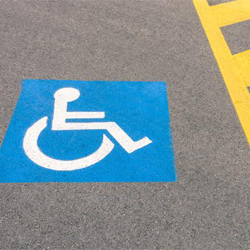Parking Permits for the Disabled

Disabled parking (DP) permits/placards help people with disabilities have easy access to places such as supermarkets, restaurants, shopping malls, medical facilities, and more. The disabled accessible spaces are required to connect to the shortest possible route to the building they serve. Disability is classified as having difficulty in bodily coordination or unable to see clearly. An individual who is paralyzed, missing limbs, unable to move without an assistive device such as crutches, suffers from a disabling disease that impairs movement, partially blind, or completely blind may be issued a disabled parking permit. The Department of Motor Vehicles (DMV) in each state provides disabled parking permit applications. A licensed physician, surgeon, physician assistant, nurse practitioner, chiropractor, or optometrist who has knowledge of the disease and/or disability must sign the doctor’s certification section of the application for a disabled parking permit.
The signed application must be returned to the Department Of Motor Vehicles (DMV) for the actual placard or license plate. There are different types of disabled parking permits, permanent and temporary. The disabled parking permit or license plate is only valid when used by the person with the disability or someone who is driving the person with the disability. It is a violation of state law to park in a disabled parking spot without the person with the disability in the vehicle. States may have different laws regarding disabled parking requirements, but it is common for all states to honor permits issued in other states. To understand all requirements in the state where a disabled person resides, visit the state’s DMV office or website.




